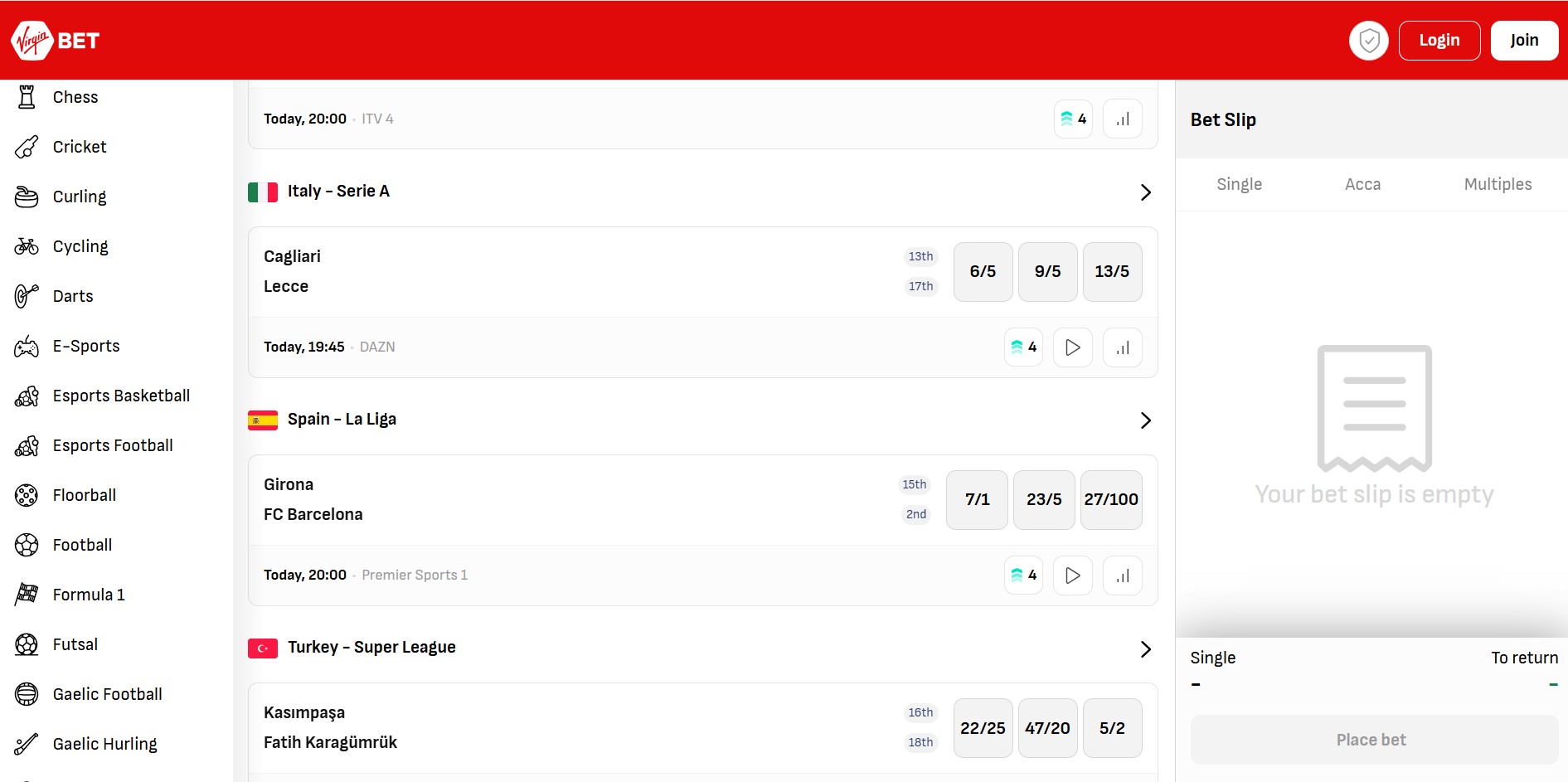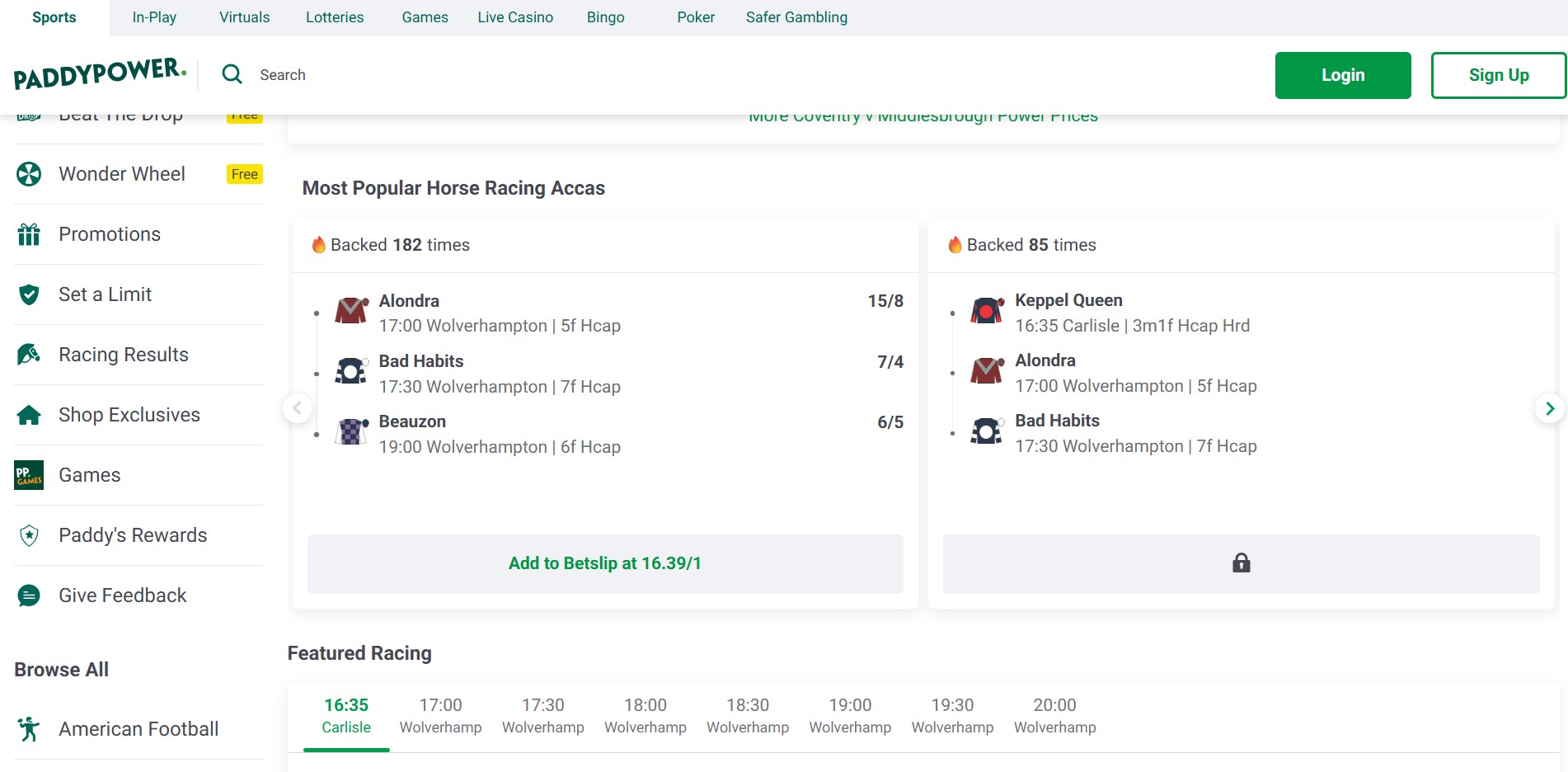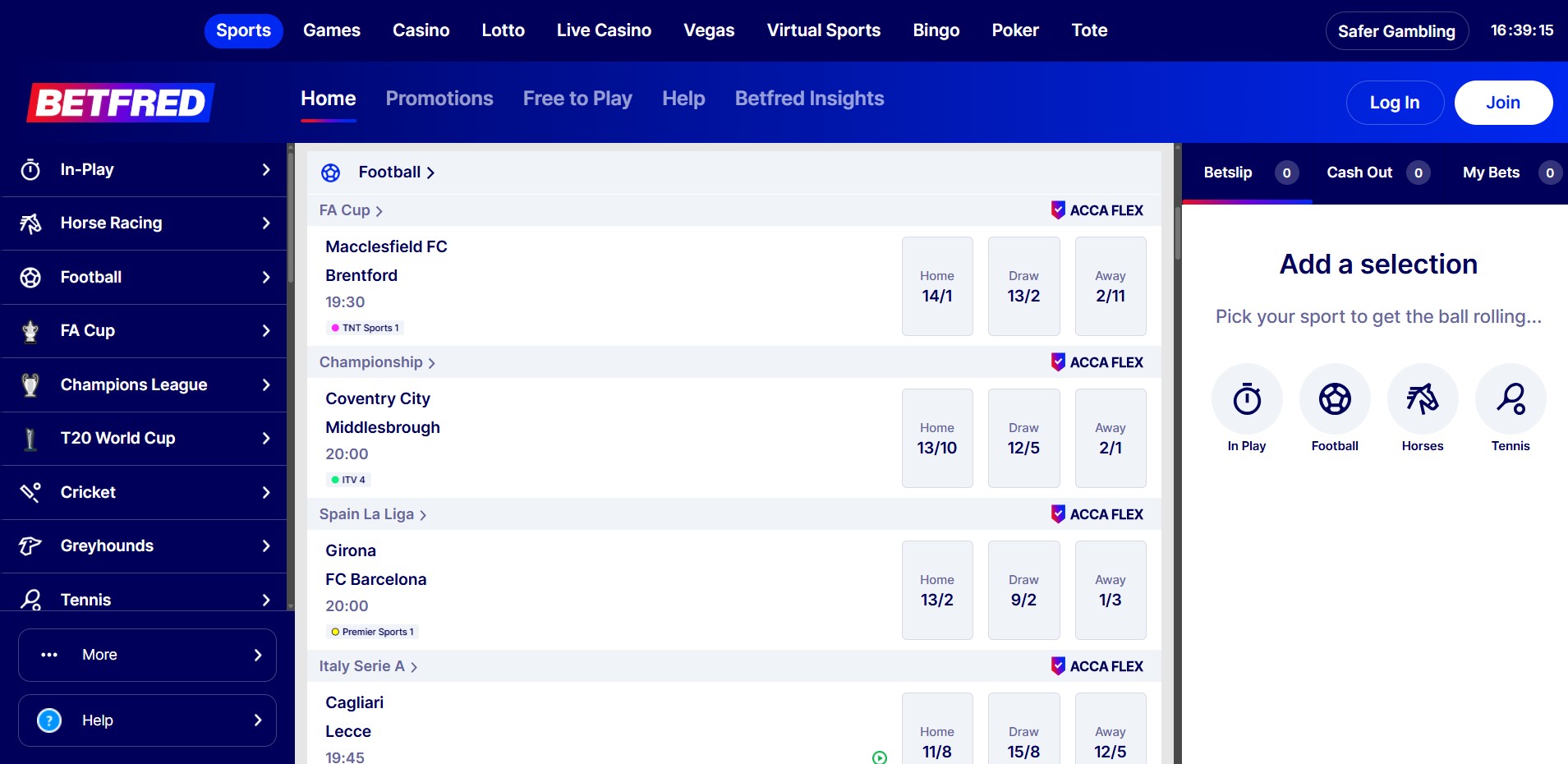Betting sites not on GamStop give UK punters a fresh alternative to the standard self-exclusion system, opening up a broader and often more flexible betting experience. With international licences rather than UK Gambling Commission oversight, these platforms tend to offer bigger bonuses, a wider range of markets, and features you might not find on traditional UK-regulated sites.
Whether you live for the Saturday football kick-off, follow the horses year-round, or simply want to try something different, the non-GamStop scene has plenty to explore. From competitive odds and generous promotions to diverse payment options and global sporting coverage, there’s a real sense of variety across these platforms.
In this guide, we’ll walk you through some of the leading options, highlight what makes each one stand out, and explain both the advantages and the responsibilities that come with betting outside the UK framework.
Top 10 Betting Sites Not on GamStop
- Huge variety of casino games
- Games from the biggest game studios
- 24/7 friendly customer support
- Up to $100k weekly bonuses
- Free spins and free bets, up to 25% cashback for VIP clients
- Instant withdrawals and high betting limits
- Extensive VIP loyalty program
- Top gaming providers
- Exclusive UFC promos
- Generous welcome offer for everyone
- 24/7 friendly live customer support
- Play games from the vast Library
- Generous Bonuses & Cashback
- Fast Withdrawals with Crypto & E-Wallets
- Extensive VIP loyalty program
- Weekly tournamenets and races
- Personal VIP host available 24/7 for VIPs via messangers
- Fast withdrawals. Jackpot 100k+
- Lightning-Fast, Fully Transparent Payouts
- Exclusive, One-of-a-Kind Offers
- A Carefully Curated Portfolio of 15,000+ Slots
- Lightning-fast & Transparent Payouts
- Unique exclusive offers to take your experience to the next level
- A curated portfolio of more than 15.000 slots
- Fast payouts / crypto-friendly
- Wide slots + providers
- Strong VIP + promos
- Huge welcome package
- 24/7 multilingual customer support
- Loyal VIP program
- Massive gaming library with over 40 game studios
- Payment alternatives from crypto to credit cards
- Instant play mini games like Aero and Speedx
Our research has identified ten exceptional platforms that UK bettors consistently praise for quality, reliability and value. Each operator brings something distinctive, whether that’s innovative features, generous rewards or specialist market coverage.
| Betting Site | Our Rating | Welcome Offer | Standout Feature |
|---|---|---|---|
| Virgin Bet | 4.9/5 | Bet £20 Get £20 | Virgin Red ecosystem rewards |
| Betfred | 4.8/5 | Bet £10 Get £50 | Exceptional bonus generosity |
| Paddy Power | 4.8/5 | Bet £10 Get £40 | Bold personality and innovation |
| Coral | 4.7/5 | Bet £5 Get £40 | Racing heritage and specials |
| Midnite | 4.7/5 | Bet £10 Get £30 | Esports leadership and speed |
| Sky Bet | 4.7/5 | Get £30 in Free Bets | Football market dominance |
| BoyleSports | 4.6/5 | Bet £10 Get £30 | Irish racing expertise |
| NRG | 4.6/5 | Bet £10 Get £10 | Clean, streamlined platform |
| Parimatch | 4.5/5 | Bet £10 Get £20 | Global markets and crypto |
| Betmorph | 4.5/5 | Bet £10 Get £15 | Novel betting mechanics |
These operators have demonstrated consistent excellence through player feedback, platform performance and the sheer breadth of opportunities they deliver. Your perfect match depends on your betting style and priorities.
Five Outstanding Betting Sites Not on GamStop
Selecting the right platform means understanding what makes each operator special. We’ve spotlighted five standouts that consistently exceed expectations for UK punters exploring beyond GamStop.
1. Virgin Bet – #1 On Our List of Non GamStop Bookies

Virgin Bet redefines what betting platforms can offer by weaving gambling seamlessly into Virgin’s broader lifestyle ecosystem. The platform radiates modernity, featuring sleek designs and logical navigation that makes discovering your favourite markets genuinely pleasant rather than a chore.
The Virgin Red integration transforms every wager into ecosystem value. Each bet earns points redeemable across Virgin’s empire (think flights, fitness memberships, dining experiences and entertainment). For Virgin enthusiasts, this cross-pollination creates exceptional value that traditional bookmakers simply cannot match.
Market coverage strikes an impressive balance between breadth and depth. Football enjoys comprehensive treatment with hundreds of betting options per significant fixture, whilst racing enthusiasts benefit from enhanced place terms and targeted money-back promotions. The statistics centre delivers actionable insights without burying you in overwhelming data streams.
Pricing remains sharp across popular markets, regularly matching or surpassing major competitors. Live betting flows smoothly with minimal lag, and the included match visualisations let you track action without juggling multiple screens or apps. The mobile application handles everything beautifully, from lightning-quick bets to detailed market exploration.
Why We Rate Virgin Bet:
| Feature | Score |
|---|---|
| Market Selection | 4.5/5 |
| Promotional Value | 4.5/5 |
| Payment Speed | 5/5 |
| Unique Features | 5/5 |
| Mobile Platform | 4.5/5 |
Strengths:
✅ Virgin Red ecosystem creates unmatched cross-platform rewards
✅ Strikingly clean, contemporary interface prioritising user enjoyment
✅ Sharp odds across football and racing markets
✅ Blazing withdrawal speeds, usually completing within hours
✅ Excellent mobile app delivering complete functionality
Limitations:
❌ Niche sport selection narrower than industry giants
❌ Relative newcomer to betting compared with established names
2. Betfred – Great for Free Bets & Bonuses

Betfred’s reputation rests firmly on rewarding customers generously, evident immediately from their substantial welcome package. The platform marries traditional bookmaking expertise with contemporary functionality, appealing equally to experienced punters and those just discovering sports betting.
Market organisation demonstrates genuine thoughtfulness. Football spans Europe’s elite leagues through to lower-tier competitions, with major matches featuring hundreds of betting angles. Racing receives comparable attention—Betfred’s racing pedigree shines through detailed form data, race footage and competitive place terms that dedicated racing fans genuinely value.
The accumulator culture Betfred nurtures particularly appeals to combination bettors. Regular acca enhancements, insurance schemes and boosted multiples inject tangible value for those combining selections. Their signature “Goals Galore” and “Both Teams to Score” markets have cultivated devoted followings amongst football punters.
The rewards programme recognises consistent participation with continuing bonuses, complimentary bets and members-only opportunities. Betfred particularly elevates their game during major sporting occasions when promotional calendars intensify, delivering enhanced prices and insurance specials that amplify excitement.
Why We Rate Betfred:
| Feature | Score |
|---|---|
| Market Selection | 4.5/5 |
| Promotional Value | 5/5 |
| Payment Speed | 4/5 |
| Unique Features | 4.5/5 |
| Mobile Platform | 4.5/5 |
Strengths:
✅ Market-leading welcome bonus delivers instant account value
✅ Exceptional accumulator promotions and price boosts
✅ Strong football and racing portfolios with substantial depth
✅ Consistent reload bonuses rewarding existing customers
✅ Impressive performance during marquee sporting events
Limitations:
❌ Bonus conditions warrant thorough examination
❌ Withdrawal processing slightly slower than premium competitors
3. Paddy Power – Among the Best Betting Sites Not on GamStop

Paddy Power categorically refuses mediocrity, and that audacity makes them magnificent. The platform fuses serious betting capability with irreverent personality that genuinely elevates the experience. Everything radiates energy and engagement, from visual design through to imaginative promotional campaigns.
Market diversity genuinely impresses. Football stretches from Premier League glamour to obscure international divisions, with inventive tools like RequestABet enabling completely bespoke wagers. Racing garners equally stellar treatment, spanning UK, Irish and global meetings with pricing that frequently outperforms rivals.
Paddy Power’s pricing competitiveness deserves highlighting. Enhanced odds regularly appear on headline events, whilst the “Price Boost” mechanism lets you request improvements on selections catching your fancy. Live markets refresh rapidly, supplying real-time statistics and graphics that inform decisions as action unfolds.
Transaction processing flows beautifully smoothly. Payment diversity includes debit cards, PayPal and multiple e-wallets, with withdrawals typically completing within hours. This velocity adds genuine convenience, eliminating frustrating waits to access winnings.
Why We Rate Paddy Power:
| Feature | Score |
|---|---|
| Market Selection | 5/5 |
| Promotional Value | 4.5/5 |
| Payment Speed | 5/5 |
| Unique Features | 5/5 |
| Mobile Platform | 4.5/5 |
Strengths:
✅ Outstanding football and racing portfolios with creative angles
✅ Competitive pricing amplified through regular enhancements
✅ Charismatic brand personality making betting genuinely entertaining
✅ Lightning transaction processing delivering same-day settlements
✅ Pioneering features including early football payouts
Limitations:
❌ Promotional conditions can require careful scrutiny
❌ Certain niche sports lack the depth of mainstream offerings
4. Coral – Betting Sites Not on GamStop with Racing Excellence

Coral channels decades of racing heritage into their digital platform, crafting something that honours tradition whilst embracing modernity. The equilibrium they’ve achieved makes the platform welcoming for beginners whilst satisfying the requirements experienced punters demand.
Market breadth impresses genuinely across major sports. Football receives thorough coverage with hundreds of angles per fixture, spanning basic outcomes through intricate player performance markets. Their Bet Builder tool functions brilliantly, combining multiple selections from identical matches with recalculated odds maintaining competitiveness.
Racing remains Coral’s jewel. “Extra Places” promotions deliver genuine security across selected handicaps, whilst the Racing Hub consolidates enhanced opportunities, cashback specials and amplified prices conveniently. Daily UK and Irish racing coverage excels, featuring sharp pricing and generous place terms.
The accumulator safety net has proven immensely popular—when one selection disappoints in your combination, Coral refunds stakes as complimentary bets. This cushions near-miss frustration and encourages bolder betting. Regular enhanced odds on showcase matches inject further value weekly.
Why We Rate Coral:
| Feature | Score |
|---|---|
| Market Selection | 4.5/5 |
| Promotional Value | 5/5 |
| Payment Speed | 4.5/5 |
| Unique Features | 4.5/5 |
| Mobile Platform | 4.5/5 |
Strengths:
✅ Exceptional racing product featuring Extra Places insurance
✅ Accumulator protection minimising painful near-miss losses
✅ Competitive football markets with sophisticated Bet Builder
✅ Frequent enhanced odds and refund specials
✅ Reliable mobile application performance
Limitations:
❌ Interface carries slightly traditional aesthetics versus newer platforms
❌ Some international sports feature limited market depth
5. Midnite – Next-Generation Betting Platform

Midnite embodies the next betting generation, purpose-built for contemporary digital-native punters. Everything radiates modernity, velocity and design centred on actual betting behaviour in 2026. The distinction becomes apparent immediately upon platform exploration.
Esports coverage defines where Midnite truly dominates. Whilst competitors treat competitive gaming peripherally, Midnite grants genuine prominence alongside traditional sports. Markets for League of Legends, CS:GO, Dota 2, Valorant and major titles rival mainstream sport coverage, with pricing remaining genuinely sharp.
Traditional sports certainly aren’t overlooked. Football, tennis, basketball and popular options receive solid attention with competitive pricing. The platform’s genuine advantage lies in speed—navigating between sports and bet types requires mere seconds, whilst bet placement proves brilliantly intuitive.
Cryptocurrency integration distinguishes Midnite from traditional bookmakers. Bitcoin, Ethereum and alternative cryptocurrencies offer anonymity, zero transaction fees and rapid processing. For technologically-savvy punters, this flexibility proves invaluable. The mobile experience genuinely excels, feeling purpose-built rather than clumsily adapted from desktop.
Why We Rate Midnite:
| Feature | Score |
|---|---|
| Market Selection | 4/5 |
| Promotional Value | 4.5/5 |
| Payment Speed | 5/5 |
| Unique Features | 5/5 |
| Mobile Platform | 5/5 |
Strengths:
✅ Unrivalled esports betting featuring comprehensive tournament coverage
✅ Exceptional platform velocity across all device types
✅ Cryptocurrency payment flexibility and speed
✅ Contemporary, intuitive design proving genuinely enjoyable
✅ Regular promotions spanning esports and traditional sports
Limitations:
❌ Smaller operation translates to fewer traditional sport markets
❌ Brand recognition trails established bookmaking giants
How Betting Sites Not on GamStop Stack Up
Comparing these platforms across critical criteria helps inform your decision. This breakdown examines the factors most significantly impacting your betting journey.
| Bookie | Welcome Bonus | Min. Deposit | Payment Options | Licensing Authority |
|---|---|---|---|---|
| Virgin Bet | Bet £20 Get £20 | £10 | Cards, PayPal, e-wallets | Gibraltar |
| Betfred | Bet £10 Get £50 | £10 | Cards, PayPal, e-wallets | Gibraltar |
| Paddy Power | Bet £10 Get £40 | £10 | Cards, PayPal, e-wallets | Malta/Offshore |
| Coral | Bet £5 Get £40 | £5 | Cards, PayPal, Neteller | Gibraltar/Malta |
| Midnite | Bet £10 Get £30 | £10 | Cards, crypto, e-wallets | Curacao |
| Sky Bet | Get £30 Free Bets | £5 | Cards, PayPal, Skrill | Gibraltar |
| BoyleSports | Bet £10 Get £30 | £10 | Cards, PayPal, e-wallets | Gibraltar |
| NRG | Bet £10 Get £10 | £10 | Cards, e-wallets | Malta |
| Parimatch | Bet £10 Get £20 | £10 | Cards, crypto, Revolut | Curacao |
| Betmorph | Bet £10 Get £15 | £10 | Cards, e-wallets | Curacao |
Observe how entry thresholds, welcome packages and licensing jurisdictions vary—elements substantially influencing your betting environment and security assurance.
Getting Started with Betting Sites Not on GamStop
Follow these straightforward steps to signing up with non GamStop bookies and online casinos.
- Select Your Platform – Evaluate the operators we’ve profiled, weighing welcome packages, market strengths and features matching your preferences.
- Complete Registration – Fill the registration form precisely. You’ll supply your name, birth date, address, email and establish login credentials. Precision matters—information must align with any identification subsequently provided.
- Verify Identity – Most operators mandate identity confirmation before processing withdrawals. Upload photographic ID (passport or driving licence) plus address proof (utility bill or bank statement). Early completion prevents frustrating delays.
- Fund Your Account – Review welcome offer conditions for minimum deposit specifications. Deposit at least this amount using your chosen payment method. Remember certain methods may disqualify bonus eligibility.
- Place Qualifying Wager – Most welcome packages require qualifying bets at specified minimum odds. Scrutinise terms carefully—typically you’ll wager your deposit at odds of 1.50 or above within defined timeframes.
- Collect Your Bonus – After satisfying qualifying criteria, your bonus credits or complimentary bets materialise in your account. These typically include stipulations covering minimum odds for usage, expiration periods and wagering obligations.
Betting Sites Not on GamStop vs GamStop Bookies
Grasping distinctions between GamStop-registered platforms and alternatives empowers informed choices suited to your circumstances.
| Feature | GamStop Sites | Non-GamStop Alternatives |
|---|---|---|
| Regulation | Full UKGC supervision | International jurisdiction licensing |
| Self-Exclusion | Centralised via GamStop | Individual operator basis |
| Consumer Rights | UK-specific safeguards | Varies by licensing authority |
| Dispute Resolution | UKGC-approved mechanisms | Dependent on licence jurisdiction |
| Payment Methods | UK-centric options | Often expanded range including crypto |
| Market Variety | Comprehensive | Can prove more extensive |
| Promotional Offers | UK regulations govern | May demonstrate greater generosity |
| Responsible Tools | Mandatory comprehensive suite | Available but standards fluctuate |
Neither classification proves inherently superior—they serve distinct purposes. GamStop sites deliver maximum UK regulatory safeguarding. Non-GamStop alternatives supply flexibility and frequently different features, but demand heightened personal responsibility.
UK Online Casinos Not on GamStop

Many platforms operate excellent online casinos alongside sports betting sites. If you relish slots, table classics or live dealer action, these double as premium casino destinations.
1. Coral Casino
Showcasing roughly 450 slots plus thorough table game sections. “Coral Exclusives” presents branded games unavailable elsewhere. Regular slot tournaments enable competition against fellow players for prize pools.
2. Virgin Bet Casino
Exceeding 500 games from premier providers spanning classic slots through progressive jackpots. The live casino showcases professional dealers broadcasting in HD across roulette, blackjack and baccarat offerings. Casino participation earns Virgin Red points, amplifying cross-platform value.
3. Betfred Casino
Housing 500+ games with notably robust progressive jackpot representation. Multiple blackjack and roulette variants accommodate diverse playing styles. The casino club rewards scheme recognises regular participation with bonuses, complimentary spins and exclusive opportunities.
4. Paddy Power Casino
Featuring 600+ slots from NetEnt, Microgaming and Pragmatic Play. Multiple live casino tables present varying stake ranges. Seamless integration permits effortless switching between sports wagering and casino entertainment.
5. Midnite Casino
A curated collection prioritising quality over quantity. Contemporary slots from leading providers alongside classic table options. The rapid-loading platform renders casino gaming as smooth as sports betting.
Popular Sports at Betting Sites Not on GamStop

One of the best things about non GamStop betting sites is the sheer expanse of sports betting opportunities. Here’s some more on that.
Football Betting
Football commands UK betting attention, and several platforms excel serving match-day punters with comprehensive markets and sharp pricing.
Premier League and European Football
Paddy Power leads Premier League wagering. Market depth regularly surpasses 200 options per fixture, spanning basic outcomes through specific player actions and imaginative specials. Enhanced odds on featured matches inject genuine value, whilst early settlement offers mean receiving payment when your team establishes two-goal advantages.
Virgin Bet’s football coverage impresses with hundreds of markets per match and excellent Bet Builder capability. The statistics centre supplies valuable intelligence without overwhelming data. Live markets refresh smoothly, managing high traffic during major fixtures without frustrating delays.
International and Lower League Coverage
Betfred supplies excellent depth across international tournaments and English football’s lower tiers. When major competitions arrive, market variety expands dramatically. Coverage of Championship, League One and League Two fixtures exceeds numerous competitors, offering value for those following beyond elite divisions.
Live Football Wagering
Coral’s live betting interface refreshes rapidly during matches, with in-play markets adapting as situations develop. The platform manages major fixture traffic dependably, proving reliable for live wagering. Cash Out availability across most markets adds welcome adaptability.
Horse Racing Betting
Racing enthusiasts discover plenty to appreciate, with several platforms offering features specifically tailored for racing devotees.
Daily Racing Coverage
Paddy Power and Coral both excel in daily UK and Irish racing. Every fixture receives attention featuring competitive pricing, generous place terms and markets beyond standard win and place options. Best Odds Guaranteed features mean benefiting when your selection’s Starting Price surpasses your taken price.
Betfred maintains robust racing heritage with enhanced place terms and regular promotions. Their Racing Centre consolidates offers, statistics and upcoming fixtures conveniently.
Major Festival Coverage
When Cheltenham, Aintree, Royal Ascot and major festivals arrive, platforms elevate offerings. Coral historically executes substantial campaigns including enhanced place terms and specials injecting value across festival periods. Refund specials and accumulator protection reduce near-miss disappointment.
Racing Intelligence and Tools
Virgin Bet supplies comprehensive form guides, course statistics and trainer/jockey intelligence helping inform selections. Race replays and results services enable reviewing races and refining approaches for subsequent fixtures.
Mobile Betting Experiences
Contemporary betting increasingly occurs via smartphones and tablets, rendering mobile performance absolutely vital.
Dedicated Mobile Applications
Midnite’s application represents modern mobile betting executed brilliantly. Rapid, intuitive and feature-complete, it supplies everything required without unnecessary complexity. Bet placement requires seconds, markets load instantly, and the overall experience feels genuinely purpose-built.
Virgin Bet and Paddy Power both deliver robust applications across iOS and Android. Complete platform functionality includes live streaming where available, Cash Out capabilities and comprehensive account administration. Biometric authentication adds convenient security.
Browser-Based Mobile Betting
Not everyone desires dedicated applications, and contemporary mobile browsers manage betting sites excellently. Betfred and Coral supply responsive browser experiences adapting beautifully to smaller displays without compromising functionality.
Sites employing HTML5 technology perform optimally on mobile. We’ve tested extensively, and all recommended platforms function smoothly via mobile browsers.
Mobile-Exclusive Advantages
Several platforms present mobile-specific promotions and features. Paddy Power occasionally executes enhanced prices exclusively for mobile users. Virgin Bet’s application sometimes includes opportunities unavailable on desktop. These furnish extra incentives for smartphone wagering.
How to Get the Most Value from Bookies Not on GamStop
Beyond welcome packages, ongoing promotions inject value throughout your betting journey.
1. Seek Regular Reload Incentives
Many platforms present deposit bonuses to existing customers, typically weekly or monthly. Betfred executes regular reload opportunities, particularly surrounding major sporting occasions. These usually require qualifying deposits and wagers to activate bonus credits.
2. Opt for Accumulator Enhancements
Accumulator wagers attract bonus promotions across football, racing and additional sports. Coral presents accumulator insurance, refunding stakes as complimentary bets if one selection disappoints. Others supply odds amplifications—additional percentage returns on combinations with specific selection quantities.
3. Find Cashback Opportunities
Some sites supply cashback on losses across defined periods. Parimatch occasionally executes weekly cashback promotions returning percentages of net losses as bonus funds. Terms fluctuate, but these cushion losing streak impacts.
4. Request Loyalty Recognition
Regular wagering earns points or status tiers in rewards schemes. Virgin Red integration adds exceptional cross-platform value. Paddy’s Rewards Club similarly acknowledges regular punters with diverse perks and bonuses.
5. Observe Event-Targeted Promotions
Major sporting occasions bring focused promotions. During Six Nations, Cheltenham Festival or World Cup, anticipate enhanced odds, refund specials and accumulator amplifications tied specifically to those competitions.
Banking at Non GamStop Betting Sites
Non GamStop betting platforms have seriously stepped up their banking game. Today’s sites offer a wide mix of fast, secure, and flexible payment methods — making it easier than ever to deposit, withdraw, and get back to the action without unnecessary delays.
Traditional Payment Methods
Traditional banking options are still favoured by many UK punters.
- Debit Cards (Visa & Mastercard)
Still the most popular choice among UK bettors, debit cards are accepted almost universally. Deposits are instant, so you can place bets straight away, and withdrawals typically land within 1–5 days. Simple, reliable, and familiar — it’s easy to see why cards remain a top pick. - Bank Transfers
Ideal for larger transactions, bank transfers provide a secure and dependable option. While processing usually takes 2–5 business days, they’re well suited to players who prioritise stability over speed.
E-Wallet Solutions
E-wallets are still popular on bookmakers not on GamStop in the UK.
- PayPal
Accepted at leading UK-facing brands such as Virgin Bet, Paddy Power, and Coral, PayPal offers instant deposits and impressively fast withdrawals — often within 24 hours. The added layer of buyer protection makes it especially appealing to security-conscious players. - Skrill & Neteller
Both e-wallets deliver rapid deposits and quick withdrawals, making them ideal for bettors who value speed and efficiency. Just keep in mind that some platforms exclude e-wallet deposits from welcome bonus eligibility, so it’s always wise to double-check the terms.
Modern Alternatives
These are for the more tech-minded bettors.
- Cryptocurrency
Innovative sites such as Midnite and Parimatch support Bitcoin, Ethereum, and other cryptocurrencies. Benefits include enhanced privacy, minimal fees, and swift processing times. As always with crypto, market volatility is worth considering before transacting. - Revolut
The fast-growing digital banking app is supported at platforms including Virgin Bet and Midnite. Users appreciate seamless integration, real-time spending alerts, and typically fee-free transfers.
Payment Method Comparison
| Site | Debit Cards | PayPal | Crypto | Revolut | E-Wallets |
|---|---|---|---|---|---|
| Virgin Bet | ✅ | ✅ | ❌ | ✅ | ✅ |
| Betfred | ✅ | ✅ | ❌ | ❌ | ✅ |
| Paddy Power | ✅ | ✅ | ❌ | ❌ | ✅ |
| Coral | ✅ | ✅ | ❌ | ❌ | ✅ |
| Midnite | ✅ | ❌ | ✅ | ✅ | ✅ |
| Sky Bet | ✅ | ✅ | ❌ | ❌ | ✅ |
| BoyleSports | ✅ | ✅ | ❌ | ❌ | ✅ |
| NRG | ✅ | ✅ | ❌ | ❌ | ✅ |
| Parimatch | ✅ | ❌ | ✅ | ✅ | ✅ |
| Betmorph | ✅ | ❌ | ❌ | ✅ | ✅ |
Always elect payment methods based on your priorities—velocity, security, privacy or bonus qualification.
Innovative Bookies to Keep an Eye On
The landscape continuously evolves with fresh platforms launching regularly. Several newer operators earn attention through innovative approaches.
- BoyleSports: This Irish bookmaker channels excellent racing heritage and competitive football markets to UK punters. Their enhanced place terms on selected races inject genuine value for racing enthusiasts.
- Betmorph: Concentrates on innovative wager types and market variety beyond traditional offerings. Their platform combines contemporary design with competitive pricing across mainstream sports.
- NRG: Presents a streamlined betting experience focusing on core functionality. Rapid loading, transparent market layouts and effortless bet placement define their approach. Whilst sport range proves moderate, pricing remains sharp.
How We Rate Non GamStop Betting Sites
We rigorously evaluate platforms against criteria ensuring quality, security and value.
Licensing and Security Protocols
We verify each platform maintains genuine licences from recognised gambling authorities. Whether Malta, Gibraltar, Curacao or elsewhere, we confirm licences remain active and regulators sustain meaningful supervision. Security protocols matter enormously: we seek 256-bit SSL encryption safeguarding all transactions and personal information.
User Experience Across Devices
Contemporary betting occurs on mobile as extensively as desktop. We test platforms exhaustively on smartphones, tablets and computers, assessing load speeds, navigation logic and responsiveness. Sites delivering consistent experiences regardless of device score higher.
Pricing Competitiveness and Market Breadth
We compare pricing across identical markets, monitoring performance on Premier League fixtures, major racing occasions and popular tennis tournaments. Market breadth matters—sites presenting 200+ markets per match supply greater value than those with basic options.
Bonus Conditions and Realistic Wagering
Welcome packages appear attractive, but conditions determine actual value. We scrutinise wagering obligations, minimum odds stipulations and timeframes. Bonuses requiring 20x wagering at 1.50 odds within 30 days present fair value; those demanding 50x at 2.00 odds within seven days don’t.
Payment Processing Velocity and Options
We test withdrawal timeframes personally, monitoring how long funds require reaching accounts via different methods. Platforms processing withdrawals within 24 hours rate higher than those requiring 3-5 days. Payment diversity matters—supporting cards, e-wallets and contemporary options like crypto earns additional recognition.
Customer Support Accessibility
We test live chat during various periods, noting response speeds and solution quality. Email support receives evaluation on reply velocity and helpfulness. Telephone support availability adds value, especially during evenings when many UK punters prove most active.
Responsible Gambling Implementation
Even on sites beyond UK regulation, responsible gambling tools matter. We verify deposit restrictions, reality reminders, session time boundaries and self-exclusion capabilities. Platforms presenting comprehensive controls demonstrate they value player welfare.
Safety Considerations ay Non GamStop Bookies
Understanding what operating beyond GamStop means for security proves crucial.
Licensing Beyond UK Jurisdiction
Sites operating under Maltese, Gibraltar or Curacao licences maintain regulatory supervision, just not from the UK Gambling Commission. These jurisdictions enforce standards surrounding fair gaming, financial security and dispute resolution. However, processes differ from UK regulations.
Self-Exclusion Functions Differently
GamStop supplies cross-platform exclusion, blocking access to all participating UK sites through single registration. On non-GamStop sites, self-exclusion functions per operator. If you require exclusion, you must implement individually with each platform. This demands heightened personal responsibility.
Consumer Protection Variations
UK-licensed sites present specific safeguards including segregated player funds and access to UK-based dispute resolution mechanisms. Non-GamStop platforms may present similar protections under respective licences, but processes and standards fluctuate. Research each operator’s licensing authority thoroughly.
Data Security Remains Paramount
Reputable platforms implement robust security measures. Seek SSL encryption, secure payment gateways and transparent privacy policies explaining how information is stored and utilised. Sites displaying security certificates and employing recognised payment processors demonstrate commitment to protecting your data.
Personal Responsibility
Utilising sites beyond GamStop requires acknowledging you’re responsible for managing your wagering activity. Establishing personal boundaries, taking breaks when required and being honest about whether betting remains entertainment prove crucial.
Betting Responsibly
These platforms present flexibility and variety, but require approaching with personal responsibility.
Establishing Personal Boundaries
Even when platforms don’t enforce restrictions automatically, establish your own boundaries. Determine before depositing how much you’re comfortable risking this week or month. Adhere to that threshold regardless of whether you’re winning or losing.
Recognising Problem Gambling Indicators
Regularly assess your relationship with wagering. Warning indicators include:
- Betting beyond affordable loss levels
- Chasing losses with progressively larger wagers
- Neglecting employment, relationships or obligations
- Experiencing anxiety, irritability or depression regarding betting outcomes
- Concealing betting activity from friends or family
If you recognise these patterns, seeking assistance early prevents problems escalating.
Available Support Resources
- GamCare: Supplies free confidential guidance via online chat, email and telephone. Their services extend to anyone affected by gambling, regardless of wagering location.
- BeGambleAware: Offers educational resources, self-assessment tools and links to professional support mechanisms. Their website includes practical guidance on establishing boundaries and recognising when betting ceases being entertainment.
- National Gambling Helpline: Presents similar support tailored specifically to UK residents, available around the clock.
Self-Exclusion
Whilst non-GamStop sites don’t participate in centralised exclusion, most present account closure and cooling-off periods. If you require a break, contact customer support to temporarily or permanently close your account. Remember you’ll require self-exclusion separately with each operator.
Further Safeguarding
If you’ve previously self-excluded via GamStop, utilising alternatives circumvents that protection. Honestly assess whether this proves appropriate for your circumstances. Sometimes restrictions exist for excellent reasons, and bypassing them may not serve your best interests.
Final Thoughts
These platforms present genuine alternatives for UK punters seeking different features, rewards or market options than traditional UK-licensed platforms supply. Throughout this guide, we’ve examined how they function, what they present and the considerations involved.
The platforms we’ve reviewed, from established names like Paddy Power and Betfred to contemporary operators like Midnite, each contribute distinct strengths to the betting landscape. Whether you prioritise football coverage, racing specials, esports markets or simply desire fresh betting environments, options exist matching your preferences.
However, selecting alternatives beyond GamStop accompanies responsibilities. Without UK regulatory supervision and centralised self-exclusion, we must actively manage our betting behaviour, establish personal boundaries and honestly assess whether our gambling remains recreational.
For some punters, these sites supply legitimate access to different markets and features. For others, particularly those who’ve self-excluded for problem gambling reasons, they may undermine important protective measures. Only you can determine which category applies to your circumstances.
We encourage approaching these platforms with informed awareness. Understand the licensing, scrutinise terms thoroughly, utilise available responsible gambling tools, and never wager beyond affordable loss levels. When betting remains entertainment rather than necessity, these platforms can enhance your sports-watching enjoyment.
FAQs
What exactly defines betting sites not on GamStop?
These are online betting platforms operating under licences from jurisdictions beyond the UK, typically Malta, Gibraltar or Curacao, that don’t participate in the UK’s GamStop self-exclusion programme. They’re legally accessible but aren’t regulated by the UK Gambling Commission.
Can UK residents legally access these platforms?
Currently, UK residents can access and utilise these platforms. However, these sites aren’t subject to UK gambling regulations, meaning certain UK consumer protections don’t apply. Always verify the site’s licensing and legitimacy before registering.
How do these differ from UK-licensed bookmakers?
The primary distinctions involve regulatory supervision, self-exclusion mechanisms and consumer protections. UK-licensed sites follow UKGC regulations including mandatory GamStop participation. Non-GamStop sites follow their respective licensing authority’s regulations, which differ in scope and enforcement.
Are these platforms safe for UK bettors?
Safety fluctuates by operator and licensing authority. Reputable platforms licensed by recognised regulators maintain fair gaming standards and security protocols. However, they don’t present UK-specific protections. Research thoroughly before joining any platform.
Do these sites present welcome bonuses?
Yes, most present competitive welcome bonuses, frequently more generous than UK-licensed alternatives. Always scrutinise terms carefully including wagering obligations, minimum odds and timeframes before claiming bonuses.
What payment methods can I use?
Most accept debit cards, PayPal and various e-wallets. Some also accommodate cryptocurrency and contemporary banking applications like Revolut. Payment options fluctuate by platform—verify each site’s banking page for specifics.
Where can I seek help if concerned about my betting?
GamCare, BeGambleAware and the National Gambling Helpline all supply free confidential support for anyone concerned about their gambling, regardless of wagering location. These services are available around the clock via telephone, chat or email.

